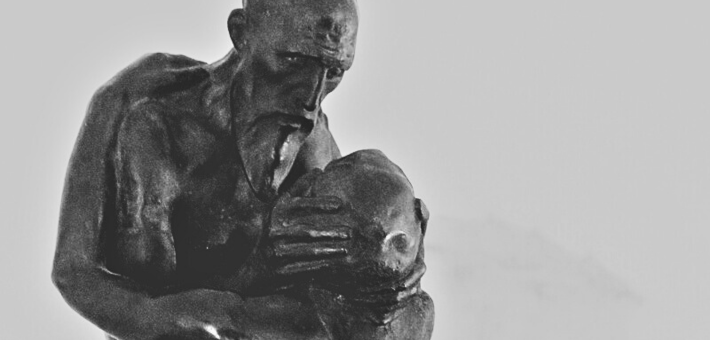Commentary on Luke 15:1-3, 11b-32
At the beginning of this pericope, we find Jesus having a conversation with tax collectors and sinners, and with those of the religious establishment, who are eavesdropping, expressing their unhappiness about the company Jesus is keeping. Jesus wants the scribes and Pharisees to realize that for people of God, there is no such thing as collateral damage. Collateral damage is a war term that refers to
harm done to persons, animals, or things that agents are not morally permitted to target in the conduct of war, as a side effect of attacks on persons, animals, or things that agents are morally permitted to target in the conduct of war.1
Sometimes during war people, places, things, or animals are killed, injured, or damaged accidentally. They happen to be in the wrong place at the wrong time. Though they did not volunteer to engage in battle or in any way consent to participate, nevertheless they became casualties of war. The term “collateral damage” is a way of justifying their demise. If the war itself is necessary and is being waged for a valid reason, collateral damage is an unintended consequence that ultimately serves a worthy and justifiable purpose. However, when people, places, and things are referred to as collateral damage, their intrinsic worth is completely overlooked.
If we adapt the definition of collateral damage to refer to unintended losses that sometimes occur in the everyday struggles of our lives, we can understand the point that Jesus is trying to make. Sometimes people, places, and things in our lives are lost for myriad reasons. The religious establishment in Jesus’ day needed an explanation for sickness and disease. They needed to be able to explain why some people were afflicted while others were not. Characterizing the sick and infirm as sinners and writing them off as collateral damage was a convenient way to explain illness while encouraging the masses to follow every jot and tittle of the law.
Jesus challenges this social practice. The good news of Jesus Christ is that nothing and no one should ever be considered collateral damage. In relation to the parable of the lost sheep, it would have been easy for the shepherd to consider one little lost sheep as collateral damage. It would have been easy to believe that one of the risks of owning and caring for sheep was that one or more of them may be lost for one reason or another. It would have been easy to focus on the health and thriving of the 99 rather than leave the 99 to find the one lost sheep.
But Jesus makes the point that every sheep has value. Every sheep is valued to the extent that their well-being is important enough to warrant a search-and-rescue mission. The mission pays off. The lost sheep is found. The community celebrates the sheep’s return because now the herd is whole.
As it relates to the parable of the lost coin, it would be easy for the woman to write off the lost coin as collateral damage. She could consider losing one of 10 coins as a common occurrence in her busy day-to-day existence. However, money is a gift of God that could be used to support lives that honor God. Even if the loss of one coin was not worth worrying about for her, the money could benefit others who were not fortunate enough to have sufficient monetary resources to meet their daily needs. So, she sweeps and keeps sweeping until she finds the lost coin. She throws a party to celebrate.
The parable of the prodigal son is perhaps the most well-known parable in the biblical text. It has been preached from many different perspectives for many cultural contexts. Like the shepherd in the first parable and the woman in the second, it would be easy for the father in this parable to write off his younger son as collateral damage. After all, he thwarts all of the prevailing social conventions and expectations by requesting his inheritance early and then leaving home and squandering it on “dissolute living.”
The father, who undoubtedly expected his sons to live wholesome and godly lives, could have allowed shame—shame of having a disobedient and wayward son—to prevent him from seeking reconciliation. None of his friends, relatives, or religious leaders would find fault with him if he refused to be associated with his son again.
Instead, he refuses to think of his son as collateral damage. When he sees his son coming down the street, he does not just wait for him to get to the house; he runs to him and kisses him and welcomes him back into the family. He throws a party and celebrates the son’s return.
Sometimes, when interpretations focus on the younger son, the plight of the older son is overlooked. His emotions become collateral damage as the father reconciles with the younger son. The elder son has done everything his father, his religious community, and his culture expects of him. He has been present to make sure the land and household are cared for and run efficiently. He has been the one his father could depend on every day while the younger son was away from home partying. When some people highlight his expressions of frustration and disappointment with not having a fatted calf killed and roasted for him, they characterize the older son as selfish or self-interested.
However, preachers have an opportunity to highlight how emotions can sometimes become collateral damage when we focus attention on one person while ignoring the effects on others. The elder son believes his faithfulness and steadfastness deserve even greater celebration than that which is enjoyed by the younger son. Yet his father attempts to explain that the elder son does not need a celebration because all that the father owns now belongs to him. The father does not seem to understand that while the older son appreciates “stuff,” he craves recognition and acknowledgment that he is the good son. He is the one who has done the right thing. He chose the right path. Perhaps the father does not understand how public recognition is even more important for the elder son than for the younger.
Each of these parables challenges us to revisit the ways we value God’s creation, animals, money, and all of humanity. No one and nothing should be viewed as collateral damage. All of creation is loved and valued by God and should be valued and loved by those who claim to be God’s people.
Notes
- David Lefkowitz, “Collateral Damage,” War Essays in Political Philosophy, June 5, 2012, https://www.cambridge.org/core/books/abs/war/collateral-damage/5BF26DB6FE40E95DDC16F6A89BE839B0.


March 30, 2025